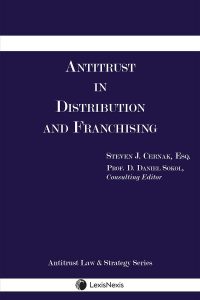
Author: Jarod Bona
You may not realize this, but a lot of people don’t like lawyers. We even have our own genre of comedy that predates Shakespeare: lawyer jokes. Here is a common example: What do you call 1000 lawyers at the bottom of the ocean? A good start!
When you heard that joke for the first time, you probably laughed and laughed, shook your head and said, “funny because it’s true.”
So why do people dislike lawyers? To save you time, I’ll focus on one reason and leave the rest for others: Because lawyers spoil the fun by saying “no.”
This reason for not liking lawyers, of course, comes from the business context where companies consult either in-house lawyers or outside counsel about how or whether to proceed on a project or opportunity.
It is the lawyer’s job and duty to risk ruining the party. The business and sales people look at the opportunity and see upside: revenues, more market share, perhaps an important merger or acquisition.
It is the lawyer that must look at the opportunity to see the downside risks: the lawsuits, the disputes, the government reactions or investigations, the response from competitors. Then, oftentimes, the lawyer says “no.” The music stops and people go back to their offices, sometimes frustrated and angry, perhaps thinking that the lawyer should be on the bottom of the ocean. The lawyer is the bad guy, even if he or she is just doing his or her job.
But this isn’t an article defending lawyers.
To be honest, most lawyers aren’t great, or sometimes even good. The same is true of most people in any profession. Only in Garrison Keillor’s Lake Wobegon, Minnesota is everyone above average (of course, he was talking about the children, but you get the point). And many criticisms about lawyers apply to many of members of this profession, including the fact that they just ruin the party by saying “no” all the time.
I think that the lawyer that just says “no” is a lazy lawyer that offers very little value to his or her client. Sometimes the lawyer must say “no,” but in most instances, there should be more and I don’t just mean justifications for the denial.
Of course, a client might come up to a lawyer and say the following: “As you know, we compete in a market with four main players. It seems silly that we spend so much time trying to undercut each other on price and so many resources trying to come out with new features to our product. Our adversaries may lack social grace, they may smell bad, and they certainly aren’t good looking, but they aren’t bad people. We could all make more money if we could just get together, have a meeting, set the price we are all going to charge, maybe divide up the customer base, probably by geography, and vote on features to add to our products.”
An antitrust attorney that hears this from a client, must say “NO,” in all caps, like they are yelling. Of course, after that, they better work on education through antitrust compliance counseling and training. Time to put together an antitrust compliance policy. The Department of Justice would certainly appreciate a strong antitrust compliance policy.
But in most instances—even where the client’s idea creates risk—a simple “no” is not the right approach, at least from a good antitrust attorney.
The scenario I described above—involving price fixing and market allocation (per se antitrust violations)—is a rare example of a situation where the antitrust laws are mostly clear.
In most instances, either the law or the application of law is not straightforward enough to entirely preclude the client’s objective. For example, the question of what is exclusionary conduct under Section 2 of the Sherman Act (Monopolization) is not an easy one to answer. There is still great debate among the courts, academics, and economists. Similar issues can arise if you are trying to determine if an exclusive dealing agreement violates the antitrust laws: Sometimes the answer isn’t clear.
Advising Business Clients on Antitrust Risks
I can’t speak for all antitrust attorneys, but here is how I handle counseling clients on antitrust risks:
First, I understand that the perspective of a business is different than the perspective of the typical lawyer.
The attorney, especially the litigator, has grown up (professionally) in a world where they win or lose a motion or case and where something is or isn’t illegal under the law. There are, of course, grey areas, but a young attorney that receives a research project, for example, is tasked with finding the “answer.” And courts have to give decisions on “the law” in such a way that suggests there is an answer, even when the reality is that it could have gone either way. But opinions rarely say that—when they do, it is a credit to the judge.
Businesses, however, make calculated judgments based upon risk, reward, and resources. Opening another factory has obvious risks and rewards and takes resources. The business executive tries to evaluate the risks, judge the potential upside, and compare both of those to the resources necessary to open the factory.
If you tell the business to not open the factory because there are “risks,” you aren’t helping it. The business executive will just stare at you like you are some sort of fool. Of course there are risks; the skill in running a business is to evaluate those risks and incorporate them into decisionmaking.
I understand this perspective even more clearly now, having run Bona Law for several years. Indeed, my bio now finally reflects that understanding.
Let’s apply this point to antitrust counseling: If a client comes to me with an opportunity, a project, or even a problem, it does the business little good for me to just say “no, there are risks.” That’s the lazy approach, in my view.
My value as the antitrust attorney in that situation is to help the client fully understand the risk. That is, I try to help the client appreciate the likelihood of the risk coming to fruition and the consequences of the risk, if it hits. And, in fact, the counseling is usually more complicated because there are often multiple risks, each with their own structure of probability and harm.
I do this because this is how businesses make decisions: They incorporate risk into the information that they have and make the best call they can.
Second, I work with the client to come up with options with similar rewards or upsides, but less antitrust risk—or some more preferable sliding scale of the risks and rewards.
Continue reading →
 The Antitrust Attorney Blog
The Antitrust Attorney Blog










